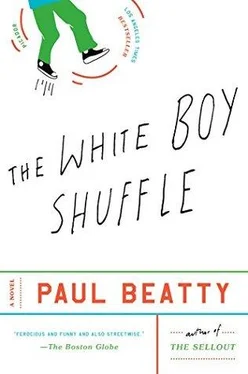Paul Beatty - The White Boy Shuffle
Здесь есть возможность читать онлайн «Paul Beatty - The White Boy Shuffle» весь текст электронной книги совершенно бесплатно (целиком полную версию без сокращений). В некоторых случаях можно слушать аудио, скачать через торрент в формате fb2 и присутствует краткое содержание. Год выпуска: 2001, Издательство: Picador, Жанр: Современная проза, на английском языке. Описание произведения, (предисловие) а так же отзывы посетителей доступны на портале библиотеки ЛибКат.
- Название:The White Boy Shuffle
- Автор:
- Издательство:Picador
- Жанр:
- Год:2001
- ISBN:нет данных
- Рейтинг книги:3 / 5. Голосов: 1
-
Избранное:Добавить в избранное
- Отзывы:
-
Ваша оценка:
- 60
- 1
- 2
- 3
- 4
- 5
The White Boy Shuffle: краткое содержание, описание и аннотация
Предлагаем к чтению аннотацию, описание, краткое содержание или предисловие (зависит от того, что написал сам автор книги «The White Boy Shuffle»). Если вы не нашли необходимую информацию о книге — напишите в комментариях, мы постараемся отыскать её.
The White Boy Shuffle — читать онлайн бесплатно полную книгу (весь текст) целиком
Ниже представлен текст книги, разбитый по страницам. Система сохранения места последней прочитанной страницы, позволяет с удобством читать онлайн бесплатно книгу «The White Boy Shuffle», без необходимости каждый раз заново искать на чём Вы остановились. Поставьте закладку, и сможете в любой момент перейти на страницу, на которой закончили чтение.
Интервал:
Закладка:
It figures a sell-out Kaufman helped jump-start the American Revolution.
Liver-lipped Euripides Kaufman, pint full, whistle and lips wet, deftly redirected the scorn of his colonial rabble-rousing shipmates from him onto a lone adolescent redcoat sentinel stationed in front of the House of Commons just outside the tavern. “Hey, blokes. Isn’t that lobster-backed scoundrel the Brit scalawag who cheated the barber Jack Milton out of the coinage for a fair-priced trimming ’n’ shave yesterday past?” With Euripides and Crispus leading the way, the drunken mob scampered outside for a closer look. Mugs in hand, they surrounded the nervous guard and peppered him with insults. Euripides stood about a yard away from the redcoat, looked him up and down, turned to his mates, and said, “Verily, that’s the tea-and-crumpet-eating-scofflaw. Crispus will support me claim, won’t you, big boy?”
Crispus’s eyes, like my father’s, like Euripides’s, were eager to please, but his mouth was empty of revolutionary dozens. Pining for white America’s affection, Crispus Attucks looked toward my great-great-great-great-great-great-great-grandad for guidance. Then he parroted Euripides Kaufman’s caustic sentiments into the face of the lone attaché of England’s New World venture capitalism. “Aye, a Cockney chimpanzee with his sparkling flushed pink arse a bit distant from the rest of the pack. Where’s your scone-colored missus? Snuggling up to King George, rubbing his pasty paunch and counting our taxes? Squawk! Crispus Attucks wants a cracker! Squawk!”
How could two nominally free niggers be more libertine? Inciting the colony’s whine for independence, black booster engines to the forthcoming rocket’s red glare. At some point during the famous imbroglio, Euripides, emboldened and bloated with beer, took out his penis and produced a pool of piss in front of the brigade of British reinforcements. Sensing that the armed platoon had reached its saturation point, he shouted, “Tax this!” and smartly marched to the rear of the now uproarious crowd. Leaving an inky, drunken Crispus Attucks fronting the overwhelmingly white mob, blathering unintelligible insults to the throne, threatening the entire British empire with his wooden nigger-beater. Then the now famous volley of shoots and thud of bodies flopping onto the dusty cobblestones.
American history found Crispus Attucks dead on a Boston street, but has yet to find Euripides Kaufman’s contribution. At the subsequent trial a witness for the prosecution recounted that he heard the soldier who deposited the ball of lead in Crispus’s heart regretfully say, “Damn, I shot the wrong bloody nigger.” Good thing too, because had that British soldier shot the right nigger, my seventh-grade class at Manischewitz Junior High would never have gotten to laugh at the ridiculous sons and daughters of the confederacy’s servant class. All fathered by my great-to-the-seventh-power granddad Euripides Kaufman.
It was in Ms. Murphy’s class that for the first time anyone outside my immediate family heard the tales of the groveling Kaufman male birthright. During Black History Month, to put a class of rootless urchins in touch with our disparate niggerhoods, Ms. Murphy assigned us to make family trees. Although most kids could only go back as far as their grandparents, it was with unabashed pride that we gave oral encapsulations of our caricature American ancestries. No one knew enough to be embarrassed at not knowing our own histories, much less those of any of the posterboard Negro heroes on the walls.
I sat midway up the first row of seats in from the door, bored with kids holding up their family trees and giving the same speech: “Ummmmm, the boys are the circles and the girls have the triangle heads. This is me. My six sisters. My brother, he dead. My other brother, he dead too. My mom. My dad. And here go my grandparents. My grandfather was in Vietnam and he crazy. Any questions? Where was my mother born? She was born in Arkansas and she met my father on the Greyhound bus. They fell in love in San Antonio and he touched her in the restrooms in Tucumcari, New Mexico. Then I came. Fuck you, Denise, I wasn’t born in no nickel pay toilet.”
Finally Ms. Murphy called my name. I tucked my family tree under my arm and made my way to the front of the classroom, slapping my boy Jimmy Lopez upside his noggin for good measure. Lifting one hand high above my head, I unfurled my gigantic family tree. It rolled well past my knees and the class ooohed the generations of crinkled stick nigger couples holding stick hands.
I started at the top, with Euripides Kaufman, and went from there. With my mother’s hand in my back, her words pouring from my mouth, I stiffly yapped on like a skinny ventriloquist’s dummy. I told the class how the Kaufmans migrated south when Swen Kaufman, Euripides’s well-traveled grandson, left Boston, unintentionally becoming the only person ever to run away into slavery. Being persona non anglo-saxon, Swen was unable to fulfill his uppity dreams of becoming a serious dancer. He was unwelcome in serious dance circles, and the local variety shows couldn’t use his “Frenchified royal court body syncopations” in their coony-coony minstrel productions. “Take the crown off your head, jigaboo. Show some teeth,” they said. Swen would stoop and bow under any other circumstances, but when it came to dance he refused to compromise. So on a windy night he packed his ballet slippers and stowed away on a merchant ship bound for the Cotton Belt.
Debarking in coastal North Carolina, Swen set out on a sojourn, seeking artistic freedom. He traipsed the tobacco roads, using his New England blue-blood diction to put off the curiosities of those concerned with his freeman status. When he ran across lynch mobs, hound dogs, and defenseless parasol-toting Southern belles, he’d simultaneously gaze at their feet and hold his nose just high enough to suggest a hint of breeding. Answering their inquiries, Swen rolled his r ’s in polite deference.
“You ain’t from ’round here, is you, bwoy?”
“No sir. Do the leotards give me away, sir?”
“Mind if we ask youin a few questions?”
“Why no, I fully understand your rrrreasons for rrrrrousting me under suspicion of my being a rrrrrunaway Negrrrrrro. Please rrrrrrresume your interrogation forrrthwith.”
“You ain’t Scottish, iz ya, bwoy?”
After three days on the road, Swen found himself on the outskirts of a small farming town called Mercy, North Carolina. There he came upon the fields of the Tannenberry plantation, where some slave hands were turning up rows of tobacco. The rise-and-fall rhythm of the hoes and pickaxes and the austere urgency of the work songs gave him an idea for a “groundbreaking” dance opera. A renegade piece that intertwined the stoic movement of forced labor with the casual assuredness of the aristocratic lyric. Entranced with the possibilities, Swen impetuously hopped the wooden fence that separated the slave from the free. Picking up a tool, he smiled at the bewildered nigger next to him and churned feudal earth until sundown, determined to learn the ways of the field slaves. I suppose the niggers warned him, but Swen wouldn’t have understood their pidgin drawl. “Fool, I don’t know who you is, but whoebba you is, if you gwine slave in this heah tobacky row, you bettuh stop scatterin’ the top serl in the wind. ’Cuz if de Tannenberrys don’t eat, den you knows the pigs and chickens gwine watch the niggers die.” Swen headed back to Marse Tom Tannenberry’s sleeping quarters happy with his first day of slavery. He went to bed that night on a stomach full of pig ears and corn leaves, and from every daybreak until his death he woke up an unindentured servant.
Initially, upon seeing a free extra hand in the cabins, Marse Tom Tannenberry smiled at his good fortune, recalling poorer days when family members outnumbered the slaves. A precocious Confederate tyke, he’d pulled on Grandma Verona’s billowing yellow whalebone dress, pleading and pouting for a nigger of his own. Marse Tom recalled the spittle and scorn in her voice when she replied with something about darkies not growing on trees.
Читать дальшеИнтервал:
Закладка:
Похожие книги на «The White Boy Shuffle»
Представляем Вашему вниманию похожие книги на «The White Boy Shuffle» списком для выбора. Мы отобрали схожую по названию и смыслу литературу в надежде предоставить читателям больше вариантов отыскать новые, интересные, ещё непрочитанные произведения.
Обсуждение, отзывы о книге «The White Boy Shuffle» и просто собственные мнения читателей. Оставьте ваши комментарии, напишите, что Вы думаете о произведении, его смысле или главных героях. Укажите что конкретно понравилось, а что нет, и почему Вы так считаете.












